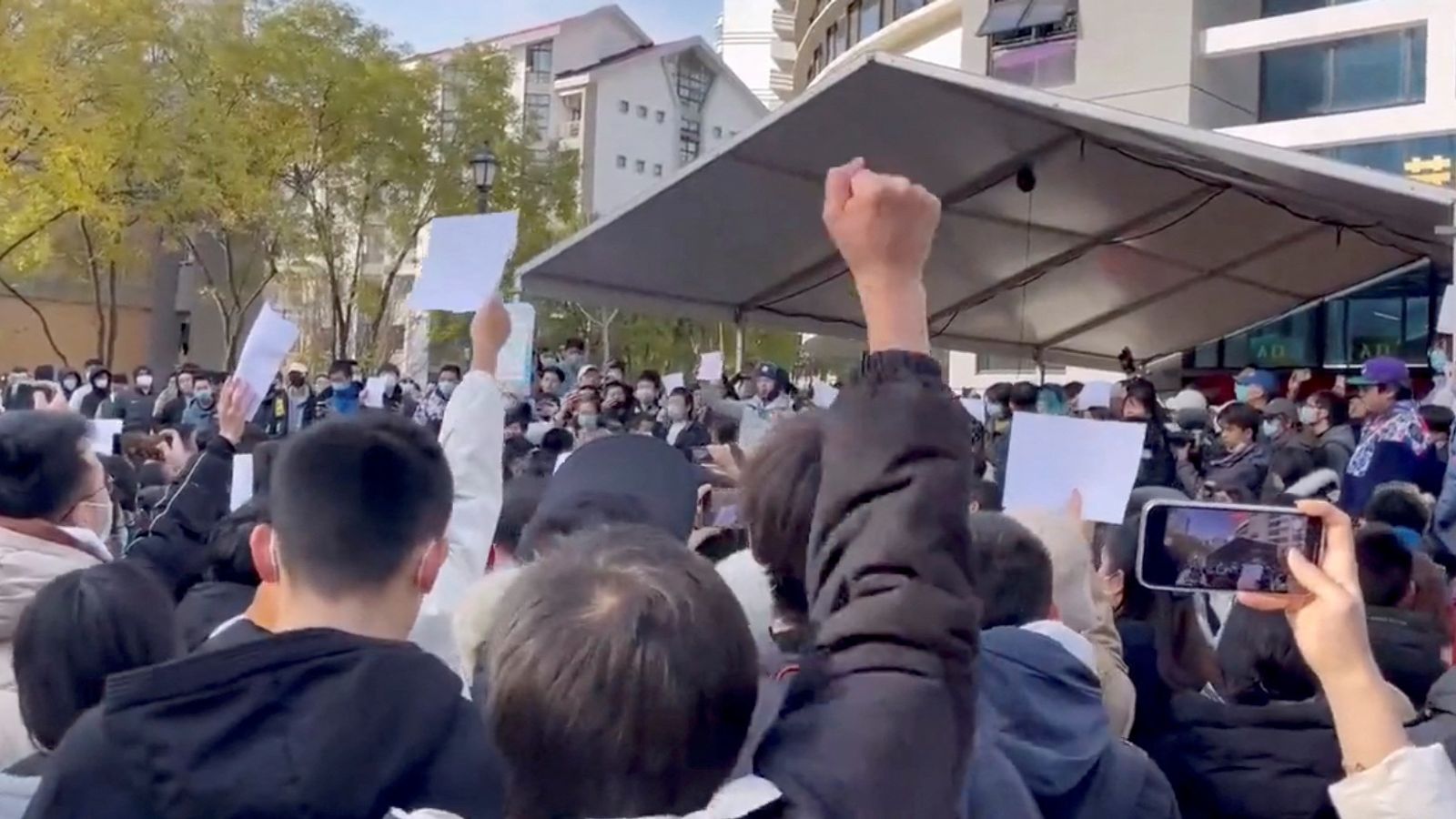Students across China have joined in a wave of dissent hitting the country, holding up blank sheets of paper in silent protest.
From the streets of several Chinese cities to dozens of university campuses, protesters have shown an unprecedented level of rebellion not seen since leader Xi Jinping assumed power a decade ago.
One journalist, working in China, said more than 50 universities nationwide have seen protests organised over the country’s strict COVID policy.
China protests – latest: ‘Utterly extraordinary’ scenes
This level of dissent has not been seen since the army crushed the 1989 pro-democracy movement centred on Beijing’s Tiananmen Square – protests that were also student-led.
白紙革命 – The white paper revolution
Images and videos circulated online show students at universities in cities including Nanjing and Beijing holding up white paper – largely seen as a tactic used to evade censorship or arrest.
Some are accompanied by the Chinese hashtag, 白紙革命, which translates as the “white paper revolution”.
“What we object to is these restrictions on people’s rights in the name of virus prevention and the restrictions on individual freedom and people’s livelihoods,” said Jason Sun, a college student in Shanghai.
Hundreds gathered on the campus of Tsinghua University – Sky News has verified the location of videos coming out of Beijing – chanting “freedom of expression democracy rule of law”.
Yesterday, the university issued a notice asking students to participate in a “student forum” about “COVID control work”.
One Chinese speaker on Weibo – whose IP registers them as not in mainland China – warned students against speaking up at these “symposiums”.
How are the protests covered in China?
Protests in China are featured heavily on English-language sites across the world – but for citizens within the country, that’s not the case.
With a history of heavily controlled state media, it is unsurprising that China’s larger sites are relatively quiet on any news of the protests.
News of a planned spaceship launch features heavily instead.
Searches for “protests” brings up either old stories about foreign protests or no news at all, forcing students and other protest groups to turn to social media to organise.
For journalists working within the country, they are toeing a tricky line. On Sunday night, the BBC said one of its staff, Ed Lawrence, was working as an “accredited journalist” when he was “beaten and kicked by police” while covering the protests.
Mr Lawrence himself has later reported people being forced to delete photos by police while out on the streets of Shanghai.
‘We are not foreign forces’
At the Chinese University of Hong Kong students gathered, also holding white papers.
In one chant, they said: “We are not foreign forces – we are Chinese youth.”
This appears to hit back at a conspiracy theory popular among pro-government influencers, which says foreign powers are sponsoring the protests so they can photoshop slogans on to the paper and say whatever they want.
Dozens of police now patrol the areas where demonstrations took place in Beijing and Shanghai. Officials have been asking people for their phones to check if they had virtual private networks (VPNs) and the Telegram app, which has been used by weekend protesters, residents and social media users said.
VPNs are illegal for most people in China, while the Telegram app is blocked from China’s internet.
Ten dead in apartment block fire
Protests first broke out in Xinjiang province on Friday night after 10 people were killed during a fire in a high rise block, with people believing strict lockdown rules prevented residents from fleeing and hampered efforts to tackle the blaze.
Xinjiang, home to China’s persecuted Uyghur minority, has experienced some of the country’s longest lockdown restrictions, with reports of people left starving earlier in the year.
Meanwhile, many of the capital’s four million residents have been unable to leave their homes for the past 100 days as Beijing pursues its “dynamic zero-COVID” policy.
Read more:
Communist Party faces threat not seen since Tiananmen massacre
Patience running out over COVID lockdowns
The zero-COVID policy has kept China’s official death toll in the thousands, compared with more than a million in the United States, but has come at the cost of confining many millions to long spells at home, bringing extensive disruption and damage to the world’s second-largest economy.
But abandoning it would mean rolling back a policy championed by Xi. It would also risk overwhelming the health system and lead to widespread illness and deaths in a country with hundreds of millions of elderly and low levels of immunity to COVID, experts have warned.






